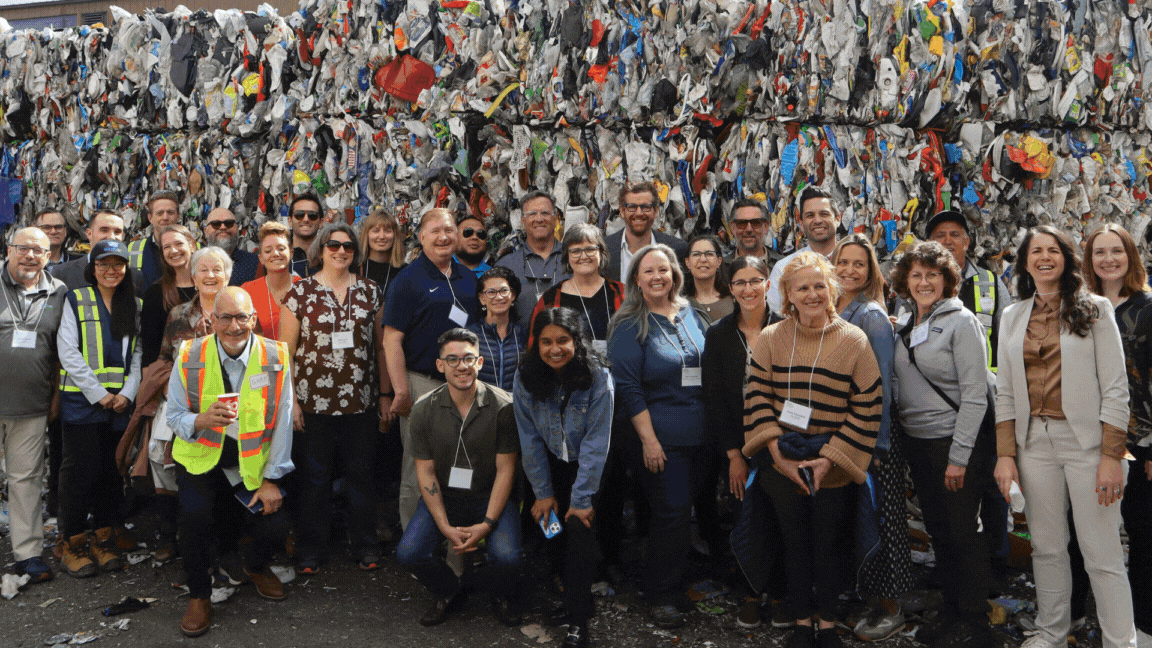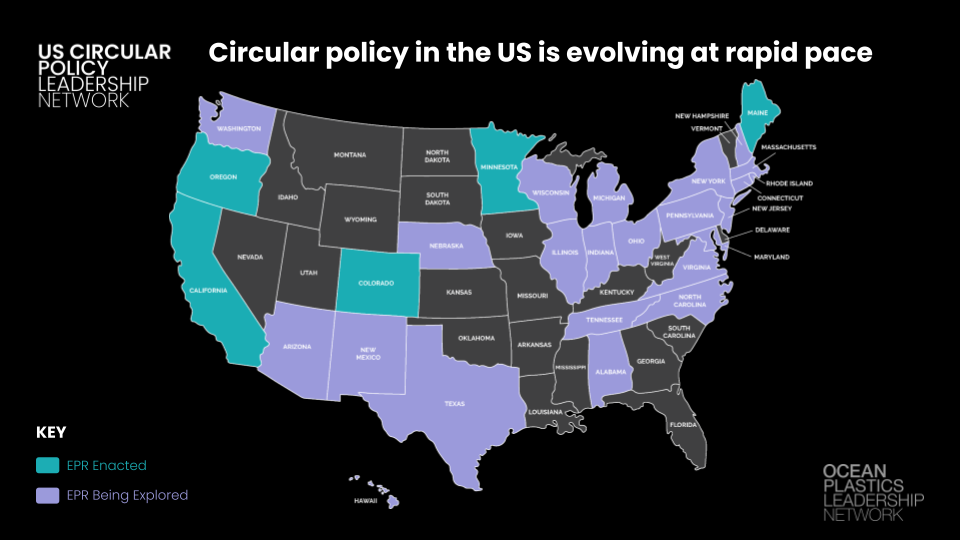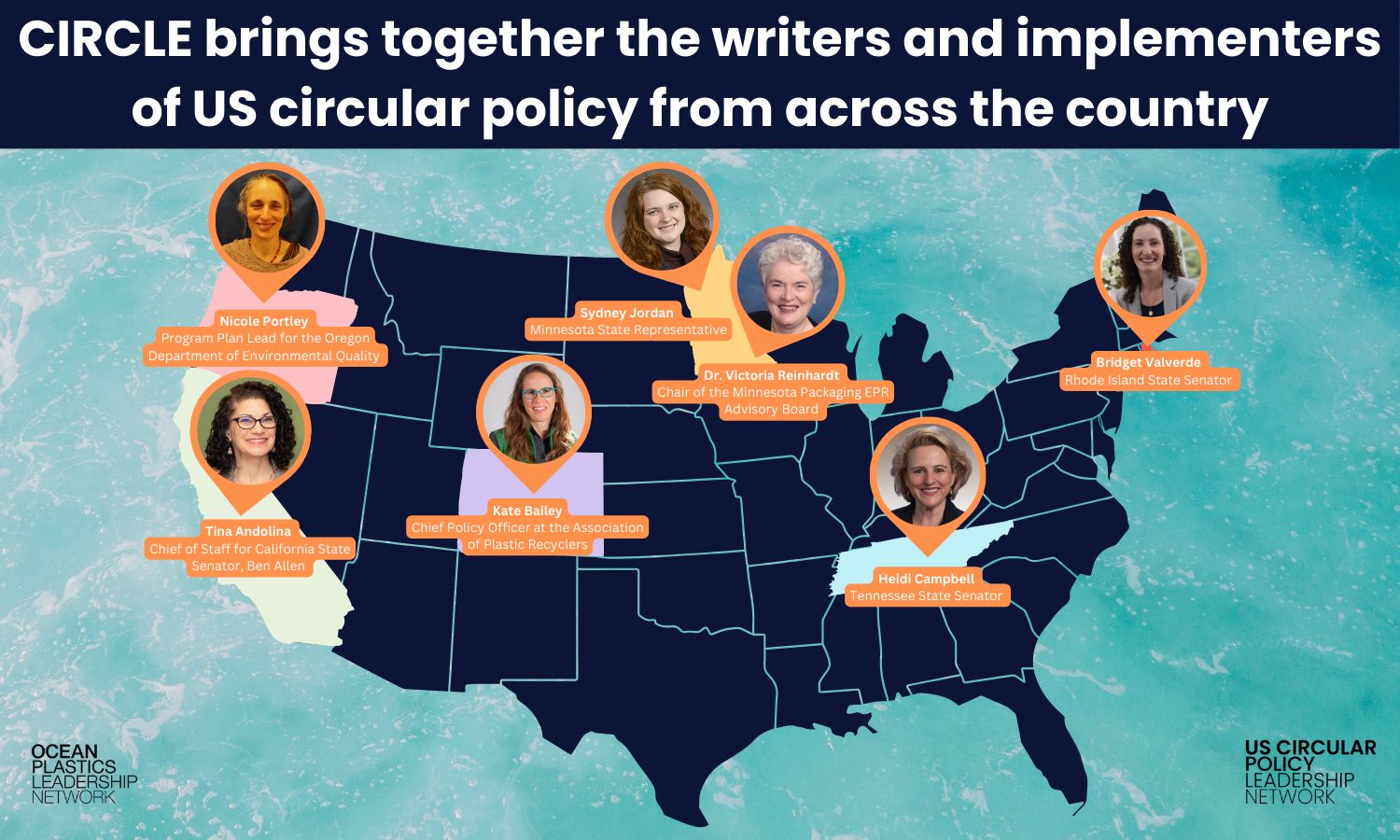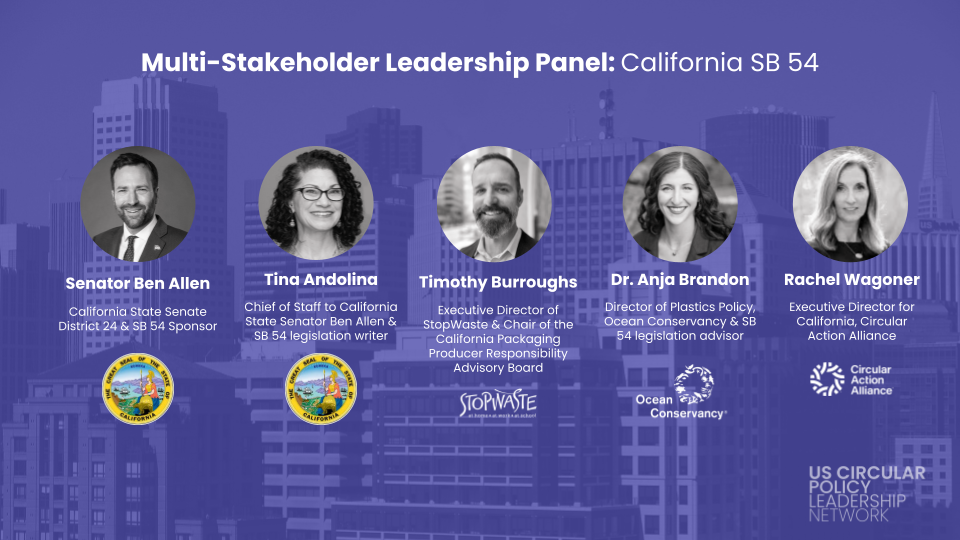From Legislation to Implementation: CIRCLE’s Role in the Evolving Landscape of U.S. EPR Policy
The EPR landscape is changing rapidly in the US. In May, Maryland and Washington state joined Maine, Oregon, California, Colorado, and Minnesota in passing EPR for packaging. Illinois and Rhode Island both saw joint EPR for packaging and Deposit Return System bills introduced, and more states introduced needs assessment language. OPLN is continuing its work through the U.S. Circular Policy Leadership Network (CIRCLE) to help unite stakeholders, foster dialogue, and build capacity for system-level circular economy approaches for legislators, industry leaders, NGOs, and policy experts across the United States. Over the past three months, we’ve convened high-impact plenaries that examined the realities of developing and implementing circular policy in the U.S. and offered a platform for in-depth dialogue on regulatory, legislative, and operational challenges. Learn more about our upcoming events, state and federal regulatory developments, and past event highlights below.
Upcoming Events: June Virtual Plenary & Montréal Summit
On June 5, we’ll host the next CIRCLE Virtual Plenary, featuring legislators from Maryland and Illinois and experts behind the Maryland, Colorado, and California needs assessments. We’ll explore how states can use data and planning to inform the next generation of circular policy—and how the private sector can prepare and participate. Attendees will have the opportunity to ask questions to legislators and suggest discussion topics for plenary Q&A. Click here for the agenda. Express Interest in attending: https://tinyurl.com/mtm2puep
From June 9–12, CIRCLE will gather in person for our Expeditionary Summit in Montréal. Participants will visit cutting-edge recovery and recycling infrastructure and engage directly with Canadian policymakers and regulators, producer responsibility organizations (PROs), and sector innovators. This summit is designed to provide experiential insight into circular systems in action and reflect on Canadian policy approaches.

NOTE: CIRCLE Expeditionary Summits are invite-only for OPLN CIRCLE members, select category experts, and U.S. state legislators. Interested in Joining? Learn more about the summit schedule here.
State and Federal Regulatory Developments
The seven states with EPR laws—Maine, Oregon, California, Colorado, Minnesota, Washington, and Maryland—have passed legislation that places responsibility for packaging waste on producers. While each law is unique, they introduce oversight through PRO, material-specific recycling goals or a process for establishing goals, and incentives for using environmentally preferable packaging. Maine was the first state to enact such legislation, passing LD 1541 in 2021 to support municipal recycling through producer-paid stewardship. Oregon followed with SB 582 in 2022, which requires producers to join a PRO and meet plastic recycling targets of 25 percent by 2028, increasing to 75 percent by 2050. California's SB 54, also enacted in 2022, is among the most ambitious, mandating that by 2032 all packaging must be recyclable or compostable, with a 25 percent reduction in plastic packaging and a 65 percent recycling rate for single-use plastics. Colorado’s HB 22-1355, passed the same year, created a statewide system funded entirely by producers. In May 2024, Minnesota passed HF 3577, requiring producer registration, the establishment of enforceable recycling targets, and penalties for non-compliance.

NOTE: CIRCLE Plenaries are invite-only for OPLN members, category experts, and U.S. state legislators. Interested in Joining? Click here to learn more: https://tinyurl.com/mtm2puep
In May 2025, Maryland Governor Wes Moore signed SB 901 into law, establishing Maryland's EPR program for packaging and paper products. SB901 proposes that producers submit five-year responsibility plans and build upon a completed needs assessment to improve materials management. Senator Augustine, one of the bill's sponsors, will join the upcoming OPLN virtual plenary to reflect on the policy and process. A Maryland Advisory Board representative will also join the session to outline stakeholder roles in the state’s needs assessment. HDR, the firm behind the state’s packaging EPR study, will share key findings and compare approaches from California and Colorado. The experts will share how legislation, roles, and scope are designed to best position PROs and regulators for effective action planning.
Meanwhile, states like Illinois and Rhode Island are exploring hybrid approaches that combine EPR with bottle deposit bills. Illinois Senator Laura Murphy will join the CIRCLE virtual plenary on June 5 to reflect on Illinois’ joint bill process, upcoming milestones, and lessons for other states building momentum for circular policies.
Beyond EPR, packaging materials legislation is gaining traction across a broader swath of the country. Several states, including New Jersey and Washington, have passed recycled content requirements. These laws mandate minimum levels of post-consumer recycled material in certain packaging formats, promoting market development for recycled feedstock. Illinois has advanced bills addressing a ban on polystyrene in schools, a single-use bag ban, and standardized tethered bottle caps to improve recyclability. New York’s proposed Packaging Reduction and Recycling Infrastructure Act calls for the elimination of harmful chemicals in packaging and sets aggressive recycled content targets across materials.
Highlights from Recent CIRCLE Events
Our March plenary explored lessons from EPR programs in Minnesota, Oregon, and California - states that saw circular policy milestones in the first quarter of 2025. The Plenary brought together policymakers, technical experts, and stakeholders for a 90-minute session on the state of U.S. circular policy and reflections from the first states translating policy into real-world implementation. Highlights included national policy updates from Dylan de Thomas (VP of Public Policy, The Recycling Partnership), a “Writer’s Room” - CIRCLE’s signature interactive “superpanel” of legislators, staff, and policy experts responsible for writing and passing US EPR bills - with Senator Bridget Valverde (RI), Senator Heidi Campbell (TN), Representative Sydney Jordan (MN), Nicole Portley (OR Oregon Department of Environmental Quality), Tina Andolina (Chief of Staff to CA Senator Ben Allen), and Kate Bailey (Chief Policy Officer, APR), and implementation insights from Dr. Victoria Reinhardt, newly elected Chair of Minnesota’s Packaging EPR Advisory Board.
At the March plenary, Tina Andolina emphasized the nuances of defining "producer" in EPR legislation, noting that obligations vary based on each state’s unique context. The panel fostered valuable cross-state learning, with Senator Heidi Campbell (TN) engaging Representative Sydney Jordan (MN) on stakeholder feedback mechanisms as Tennessee prepares its own EPR legislation. Kate Bailey shared key implementation lessons from her engagement in multiple states, underscoring the importance of clear timelines and data reporting expectations for producers. Dr. Victoria Reinhardt highlighted Minnesota’s multistakeholder advisory board model of establishing subgroups to tackle various technical questions arising—for example, aligning on infrastructure needs—offering a potential blueprint for other states bridging policy and implementation.

In April, we shifted our focus to California’s SB 54 and ongoing federal EPR developments. A leadership panel featuring California Senator Ben Allen’s Chief of Staff Tina Andolina, and leaders from Circular Action Alliance, StopWaste, and Ocean Conservancy offered firsthand reflections from SB 54 implementation. Participants examined the implications of California’s paused rulemaking process, reflections on target-setting, and the evolution of PRO, regulator, and advisory board roles. Dr. Michaela Barnett (Congressional Fellow, Rep. Paul Tonko) and Kate Bailey (Chief Policy Officer, APR) provided insights into the evolving federal framework and how it will incorporate state-level learning and definitions.

The session highlighted varying perspectives of California’s updates to compostability certifications and labeling and insights into the challenges and opportunities faced in bridging legislation to implementation. The Federal Legislation is being reviewed now in Rep. Paul Tonko's office after a public consultation period and is expected to be brought forward in the coming months.
As EPR momentum builds across the U.S., CIRCLE remains committed to equipping stakeholders with the insight, connections, and context needed for effective policy. Whether through our interactive plenaries or upcoming experiential learning in Montréal, we’re fostering a space where legislators, regulators, industry leaders, and NGOs can explore what circularity means in practice—and how to move from policy to impact. We look forward to continuing this work together in the months ahead.
Join the conversation
Now is the time to stay ahead of EPR legislation’s momentum in the US. CIRCLE will continue to bring together the writers and implementers of US circular policy from across the country. CIRCLE Plenaries are invite-only for OPLN members, category experts, and U.S. state legislators. To learn more about CIRCLE, please fill out our interest form.